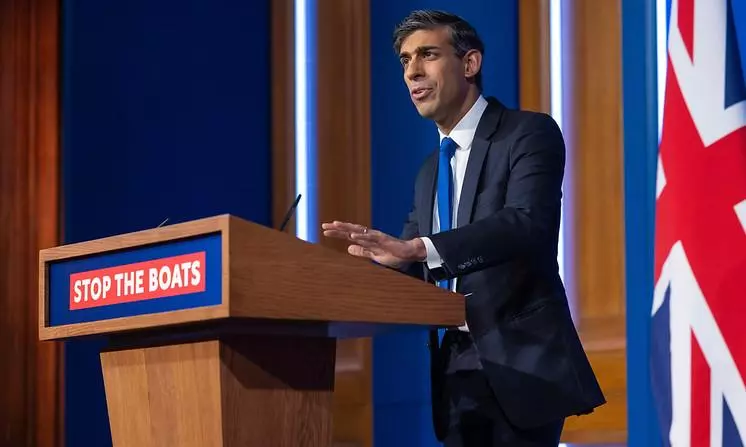
Why British PM Rishi Sunak has called for early elections
Sunak has taken an astonishing gamble considering that the Conservatives’ ratings are in such a bad shape and most opinion polls show Labour party at least 20 points ahead of Tories

British Prime Minister Rishi Sunak stunned the nation when he fired the starting gun on a general election that has cut short his premiership and prevented him from celebrating his second anniversary in office. Sunak emerged from No. 10 Downing Street in the torrential rain and announced that the county would be going to the polls on July 4 and that he had already got the go ahead from King Charles earlier in the afternoon to dissolve Parliament.
Drenched without an umbrella, Sunak’s short election speech was drowned out by his critics aptly blaring out the Labour Party’s anthem from the 1997 elections ‘Things can only get better’ at nearby protests. For most people the announcement came out of the blue including most of Sunak’s cabinet. “What is he thinking?”; “It’s like a bomb has gone off” and “Why now?” were some of the shocked responses from Sunak’s own party members.
Major gamble
In January this year, when asked for a date for the election, Sunak had replied ‘in the second half of this year’. Elections are normally held in the UK either in the spring or autumn as winter is too cold to get the electorate out and summer is a busy time with many voters out of their homes on holiday. Most people had taken the prime minister’s response to mean an election in October or November.
Sunak has taken an astonishing gamble considering that the Conservative party’s ratings are in such a bad shape and there is still a little room for delay as the term of this Parliament does not finish till January 2025. Most opinion polls show the main opposition party Labour at least 20 points ahead of the Tories which, if the election results reflect this, means an overall majority for Labour. It will take a turnaround in public opinion that is unprecedented in British history for the Conservatives to win this election and the Indian-origin Sunak to return as prime minister.
Unexpected election
Tory MPs are furious. The 66 Conservative MPs who have already said they would not be standing at the next election saw a sudden end to their careers, while those in safe Tory seats are facing the most difficult election of their lives and they blame Sunak for not giving them a warning let alone a strategy.
Many Conservatives feel there had been a case for an early election in May coinciding with the local elections that might have encouraged a larger turnout from Tory voters and possibly saved some of the 500 councillors the party lost across the country. As that did not happen, then the most likely option was the autumn as this would give the government maximum time to turn things round.
Inflation, scandals
Sunak has pinned his hopes on the drop in inflation to 2.3 per cent -- the lowest in three years, a return to economic growth and the possible lift off of the controversial Rwanda plan that should act as a deterrent to illegal immigrants entering the UK – all pledges he had made when he took over as prime minister in October 2022.
Another reason for the decision is that there is a series of big spending commitments in the offing such as more defence spending, a £10 billion compensation package for victims of the infected blood scandal and the Post Office scandal, many of whom are of Indian origin, leaving very little in the coffers for give-aways and tax cuts in the autumn Budget.
Conservative turmoil
According to Sunak’s advisers, if the budget, a government’s main pre-election weapon, is a non-starter, then why wait any longer. Despite the bad public opinion figures, the logic in Downing Street was that all things considered, July was the least bad option.
This election is a verdict on 14 years of a volatile Conservative rule. Sunak inherited a divided and broken party from his predecessor Liz Truss, whose claim to fame was the shortest tenure of any British prime minister in living memory. In a mere 44 days, Truss was able to inflict economic devastation on the country which Sunak was forced to clean up. Truss, in turn inherited the premiership from the maverick Boris Johnson, who won a huge mandate from the public in 2019 but squandered it by disgracing himself with the unprecedented ‘Partygate’ scandal.
Impending disaster?
That is why on taking up office Sunak pledged to “to lead a government with integrity, professionalism and accountability at every level”, and it is now time for the country to decide if he has fulfilled his vow. Sunak would like voters to distinguish between the Johnson and Truss administrations and his own, boasting that economic stability had been restored under him. But as opinion polls, recent parliamentary by-elections and local council elections show, voters are tired of a Conservative government which has created chaos and inflicted pain on them for over a decade and for which Sunak is touting himself as the remedy.
Sunak has made his place in history by becoming the first Indian-origin, Hindu prime minister of the UK but he was an accidental prime minister. He never got a mandate from the public and it is extremely unlikely that he will become an elected prime minister even now. In fact, he may even go down in history as leading the Conservative party to the worst defeat in living memory.
